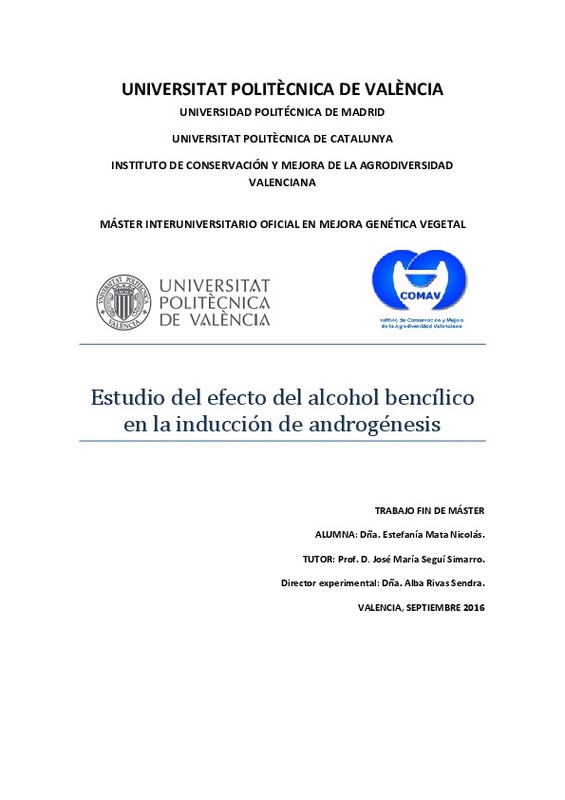JavaScript is disabled for your browser. Some features of this site may not work without it.
Buscar en RiuNet
Listar
Mi cuenta
Estadísticas
Ayuda RiuNet
Admin. UPV
Estudio del efecto del alcohol bencílico en la inducción de androgénesis
Mostrar el registro sencillo del ítem
Ficheros en el ítem
| dc.contributor.advisor | Seguí Simarro, José María
|
es_ES |
| dc.contributor.advisor | Rivas Sendra, Alba
|
es_ES |
| dc.contributor.author | Mata Nicolás, Estefanía
|
es_ES |
| dc.date.accessioned | 2016-11-29T08:35:46Z | |
| dc.date.available | 2016-11-29T08:35:46Z | |
| dc.date.created | 2016-09-26 | |
| dc.date.issued | 2016-11-29 | es_ES |
| dc.identifier.uri | http://hdl.handle.net/10251/74696 | |
| dc.description.abstract | [EN] Obtaining double haploid plants is a powerful tool for breeding programs, because these plants are 100% homozygous. These pure lines can be used as parental lines, allowing for the production of hybrids. Hybrids are interesting due to their high yield potential and to the presence of hybrid vigor (heterosis). Androgenesis is a rapid and convenient method to produce pure lines for plant breeding because androgenic double haploids reach 100% homozygosity after one in vitro generation, instead of the several generations of inbreeding needed in classical pure line production. Despite of the considerable importance in plant breeding programs, the potential of this technique cannot be fully exploited in many species due to the lack of a reproducibl e and reliable method. Regeneration of androgenic plants in many recalcitrant species, such as eggplant or pepper, occurs indirectly via callus production because embryos arrest in development and transform into calli. Efficient androgenesis is usually ind uced by the application of a stress treatment. There are many different stressing agents, with variable effects among species. The aim of this study is to determine the effect of a novel stressing agent, benzyl alcohol, on the induction of androgenesis in rapeseed, eggplant and pepper | es_ES |
| dc.description.abstract | [ES] La obtención de plantas dobles haploides es una herramienta muy valiosa en los programas de mejora, ya que estas presentan un 100% de homocigosis . Estas líneas puras actuarían como parentales, permitiendo obtener descendencia híbrida, interesante por su alto rendimiento y la manifestación de la heterosis o vigor híbrido. La androgénesis es un método que proporciona grandes ventajas a la hora de ob tener líneas puras frente a lo que sería un programa de mejora convencional, ya que estos requieren mucho tiempo y recursos económicos. Pese a que es una técnica ventajosa en especies como la colza, presenta limitaciones ya que es una metodología que toda vía necesita ser puesta a punto en muchas especies recalcitrantes como pueden ser la berenjena o el pimiento. El cultivo de microsporas aisladas presenta limitaciones en ambas especies ya que, una vez inducida la androgénesis, el embrión detiene su patrón de desarrollo embriogénico para dar lugar a un conjunto de células indiferenciadas (callos). Dentro de los múltiples factores que determinan el éxito de la técnica, tanto el genotipo como el estrés son de los más importantes. Existen multitud de estreses q ue se pueden aplicar para inducir la androgénesis, con efectos distintos en cada especie. En este estudio se pretende comprobar qué efecto tendría un nuevo agente inductor de estrés, el alcohol bencílico, sobre dicho proceso en cada una de las tres especie s | es_ES |
| dc.language | Español | es_ES |
| dc.publisher | Universitat Politècnica de València | es_ES |
| dc.rights | Reconocimiento - No comercial - Sin obra derivada (by-nc-nd) | es_ES |
| dc.subject | Androgénesis | es_ES |
| dc.subject | Embriogénesis | es_ES |
| dc.subject | Alcohol bencílico | es_ES |
| dc.subject | Microsporas | es_ES |
| dc.subject | Dobles haploides | es_ES |
| dc.subject | Brassica | es_ES |
| dc.subject | Solanum | es_ES |
| dc.subject | Capsicum . | es_ES |
| dc.subject.classification | GENETICA | es_ES |
| dc.subject.other | Máster Universitario en Mejora Genética Vegetal-Màster Universitari en Millora Genètica Vegetal | es_ES |
| dc.title | Estudio del efecto del alcohol bencílico en la inducción de androgénesis | es_ES |
| dc.type | Tesis de máster | es_ES |
| dc.rights.accessRights | Abierto | es_ES |
| dc.contributor.affiliation | Universitat Politècnica de València. Departamento de Biotecnología - Departament de Biotecnologia | es_ES |
| dc.description.bibliographicCitation | Mata Nicolás, E. (2016). Estudio del efecto del alcohol bencílico en la inducción de androgénesis. http://hdl.handle.net/10251/74696 | es_ES |
| dc.description.accrualMethod | TFGM | es_ES |
| dc.relation.pasarela | TFGM\46022 | es_ES |






